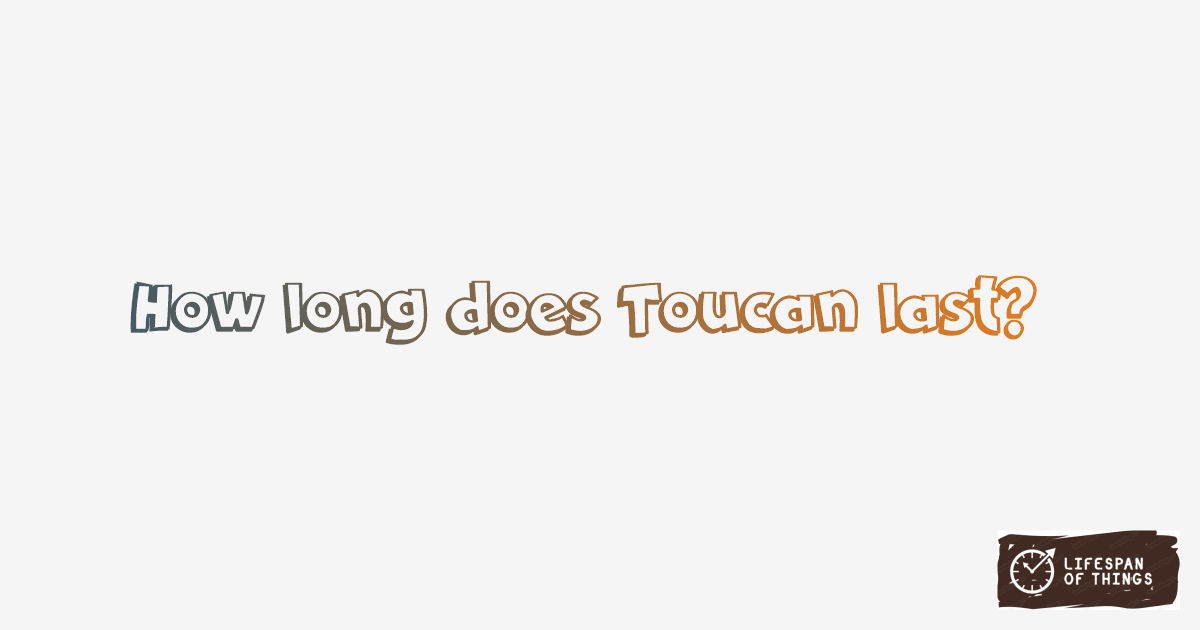
15 Years
Lifespan of Toucan is 15 Years. Toucans' lifespan can be influenced by factors like diet, habitat, and overall care. Providing a balanced diet rich in fruits, insects, and small prey contributes to their longevity. They thrive in habitats with access to tall trees for nesting and foraging, preferring tropical rainforests with warm climates. Regular veterinary checkups and proper housing are essential to ensure their well-being.
Useful Information
Toucans typically inhabit tropical rainforests with tall trees for nesting and feeding. They prefer warm climates with access to a variety of fruits, insects, and small prey. Providing spacious aviaries with sufficient space for flying and perching mimics their natural habitat and promotes their well-being.
Toucans have a diet consisting of fruits, insects, and small animals like lizards and eggs. Ensuring a diverse and balanced diet is crucial for their nutritional needs. Fresh fruits and live insects can be offered as treats to enhance their diet and provide enrichment.
To maintain the health and longevity of Toucans, regular veterinary checkups are recommended. Providing a stimulating environment with opportunities for flight and exercise is important. Ensuring access to clean water, proper hygiene, and a balanced diet supports their overall well-being.
Find out how to provide proper health care for exotic birds, from regular vet checkups to vaccination and parasite control.
Toucans exhibit social and playful behavior, enjoying interaction with their human caretakers. While they are not typically trained like some domestic birds, positive reinforcement can help in handling and bonding with them. Establishing a routine for socialization and mental stimulation can enhance their quality of life.
Toucans are not considered endangered, but their habitats are threatened by deforestation and illegal wildlife trade. Conservation efforts focus on preserving their natural ecosystems and combatting wildlife trafficking. Supporting sustainable practices and raising awareness about the importance of protecting Toucans and their habitats are crucial for their survival.
Lifespan Comparisons
| Compared Item | Comparison Description |
|---|---|
| Lifespan of Flamingo | Toucans have a lifespan comparable to flamingos, ranging from 10-15 years, making them equally long-lived in the animal kingdom. |
| Lifespan of Peacock | Peacocks can live between 15-25 years, similar to toucans in terms of longevity, showcasing the diverse lifespans of different bird species. |
| Lifespan of Scarlet Ibis | Scarlet ibis, like toucans, have a lifespan of over 15 years, indicating a common longevity among vibrant avian species in nature. |
| Lifespan of Quetzal | Quetzals boast a lifespan range of 20-40 years, showcasing a potentially longer life span compared to toucans, reflecting the diversity in bird longevity. |
| Lifespan of Starfish | Starfish have a comparatively shorter lifespan of 5-10 years, differing significantly from toucans in terms of longevity within the animal kingdom. |
| Lifespan of Sea Urchin | Sea urchins can live up to 15 years, similar to toucans, demonstrating varied lifespans across different marine and avian species. |
| Lifespan of Coral Polyps | Coral polyps have a lifespan of 5-10 years, contrasting with toucans and showcasing the diverse longevity of marine and avian species. |
| Lifespan of Parrotfish | Parrotfish share a similar lifespan of over 15 years with toucans, revealing common longevity trends among colorful and diverse aquatic and avian species. |
| Lifespan of Asiatic Lily | Asiatic lilies have a lifespan of 4-6 years, differing significantly from toucans in terms of longevity, emphasizing the diversity in lifespans across plant and animal species. |
| Lifespan of Bluebell | Bluebells have a notably shorter lifespan compared to toucans, lasting around 1 year, showcasing the vast differences in longevity between plant and animal species. |
| Lifespan of Daisy | Daisies share a lifespan range of 10-15 years with toucans, highlighting similarities in longevity across different species of flora and fauna. |
| Lifespan of Poppy | Poppies have a short lifespan of 1-3 years, contrasting sharply with toucans in terms of longevity, illustrating the diverse lifespans in the plant and animal kingdoms. |
| Lifespan of Cornflower | Cornflowers, like toucans, have a relatively short lifespan, lasting around 1 year, showcasing the wide range of lifespans across plant and animal species. |
| Lifespan of Buttercup | Buttercups boast a lifespan of 5-10 years, comparable to toucans, revealing similarities in longevity trends across plant and avian species. |
| Lifespan of Bird of Paradise | Birds of paradise are renowned for their impressive longevity of 50-100 years, outlasting toucans by a significant margin, reflecting the vast differences in lifespans among bird species. |
Frequently Asked Questions
Lifespan of Toucan is 15 Years.
Providing a spacious aviary with tall trees, fruits, insects, and small prey can mimic their natural habitat and promote their well-being.
Toucans should be fed a diet rich in fruits, insects, and small animals like lizards and eggs to meet their nutritional needs.
Regular veterinary checkups, a stimulating environment, balanced diet, and proper hygiene are key factors in maintaining the health and longevity of Toucans.
While Toucans are not typically trained like domestic birds, positive reinforcement and socialization routines can help in handling and bonding with them.
Toucans face threats from deforestation and illegal wildlife trade, impacting their natural habitats. Conservation efforts focus on protecting these ecosystems and combating wildlife trafficking.








